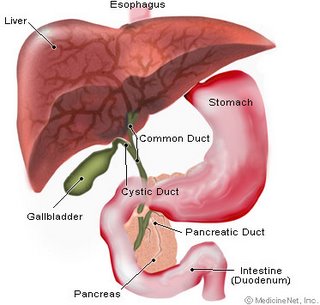Pancreas
The pancreas is a long, flat gland tucked behind your stomach between the upper part of your small intestine (duodenum) and your spleen. It plays important roles in digestion and metabolism. The organ produces enzymes essential for digestion and secretes hormones that help control blood sugar levels.
Food Needs to be Digested:
Food consists of carbohydrates (e.g. starch), proteins (e.g. meat), and fat (e.g. butter), and digestion is not possible without the enzymes produced by the pancreas. The digestive portion that produces digestive enzymes is called the "exocrine pancreas". The hormone-producing portion is called the "endocrine pancreas".
The Exocrine Pancreas:
The pancreas makes a number of different enzymes each of which is responsible for breaking down the different types of food into small particles suitable for absorption. The enzymes are made in small glands within the pancreas and travel along increasingly large tubes until finally they reach the main pancreatic tube. This connects the gland to the first part of the bowel where food passes after it has gone through the stomach.
The enzymes are not active when they are first made within the pancreas (otherwise they would digest the pancreas as well) but when they pass into the bowel they are activated by the juices in the bowel. The main enzymes are called amylase (which digests carbohydrates), trypsin (which digests protein) and lipase (which digests fats). The bile, which comes from the liver, is also very important for the digestion of fat because it acts like a soap and breaks up the fat into minute droplets so that the pancreatic lipase can digest it.
The Endocrine Pancreas:
The hormone-producing portion of the pancreas is called the "endocrine pancreas". The hormones secreted by the endocrine pancreas are insulin, glucagon, and somatostatin. The cells that secrete insulin are called Islet of Langerhans cells, or more simply just "islet cells".
Their effects are:
Food Needs to be Digested:
Food consists of carbohydrates (e.g. starch), proteins (e.g. meat), and fat (e.g. butter), and digestion is not possible without the enzymes produced by the pancreas. The digestive portion that produces digestive enzymes is called the "exocrine pancreas". The hormone-producing portion is called the "endocrine pancreas".
The Exocrine Pancreas:
The pancreas makes a number of different enzymes each of which is responsible for breaking down the different types of food into small particles suitable for absorption. The enzymes are made in small glands within the pancreas and travel along increasingly large tubes until finally they reach the main pancreatic tube. This connects the gland to the first part of the bowel where food passes after it has gone through the stomach.
The enzymes are not active when they are first made within the pancreas (otherwise they would digest the pancreas as well) but when they pass into the bowel they are activated by the juices in the bowel. The main enzymes are called amylase (which digests carbohydrates), trypsin (which digests protein) and lipase (which digests fats). The bile, which comes from the liver, is also very important for the digestion of fat because it acts like a soap and breaks up the fat into minute droplets so that the pancreatic lipase can digest it.
The Endocrine Pancreas:
The hormone-producing portion of the pancreas is called the "endocrine pancreas". The hormones secreted by the endocrine pancreas are insulin, glucagon, and somatostatin. The cells that secrete insulin are called Islet of Langerhans cells, or more simply just "islet cells".
Their effects are:
- insulin--lowers blood sugar;
- glucagon--raises blood sugar;
- somatostatin--inhibits release of a variety of hormones, including growth hormone, thyrotropin, corticotropin, insulin, glucagon, gastrin, secretin and renin.
These functions, both exocrine and endocrine, may be affected by pancreatitis, an inflammatory condition that occurs when digestive enzymes, instead of breaking down food in the small intestine, attack the pancreas itself.
..

Link to Pancreas: Wikopedia>Pancreas
Double click on the arrow inside the screen for Weird Al's fun "Pancreas" video/song!
To view information on another disease, click on Pancreatitis SOD Library.!
..

2 comments:
生活總是起起伏伏,心情要保持快樂才好哦!!.................................................................
I saw so many testimonies about Dr Itua a great HERBAL DOCTOR that can cure all kind of diseases and give you the rightful health to live a joyful life, I didn't believe it at first, but as the pain got worse and my life was at risk after visiting my therapist numerous times for combination of treatments. And no changes so I decided to take a try, I contacted him also and told him I want a cure for Vulvar cancer/ Testicular cancer and it was Stage IIIA, he gave me advice on what I must do and he delivered it to me in my state which I use according to his instruction, and today I must say I am so grateful to this man Dr Itua for curing me from Vulvar cancer/ Testicular cancer and for restoring me back to my normal health and a sound life, I am making this known to every one out there who have been living with cancers all his life or any sick person should not waste more time just contact him with his details below- WhatsApp- +2348149277967 Email drituaherbalcenter@gmail.com, believe me this man is a good man with Godly heart, this is the real secret we all have been searching for. Do not waste more time contacting him today for you to also live a sound and happy life. He cures the following disease, thyroid Cancer, Uterine cancer, Fibroid, Arthritis, Brain Tumor,Fibromyalgia, Bladder cancer, Brain cancer, HIV, Herpes, Esophageal cancer, Gallbladder cancer, Gestational trophoblastic disease, Head and neck cancer, Hodgkin lymphoma Intestinal cancer, Kidney cancer,Hpv, Lung cancer, Melanoma,Mesothelioma, Multiple myeloma,Neuroendocrine tumors Non-Hodgkin lymphoma, Oral cancer, Ovarian cancer, Sinus cancer, Hepatitis A, B/C, Skin cancer, Soft tissue sarcoma, Stroke, Lupus, Spinal cancer, Stomach cancer, Vaginal cancer,Vulvar cancer, Testicular cancer,Tach Diseases, Pancreatic Cancer, Leukemia, Liver cancer, Throat cancer, Alzheimer's disease, Chronic Diarrhea,Copd, Parkinson,Als,Adrenocortical carcinoma Infectious mononucleosis.
Post a Comment